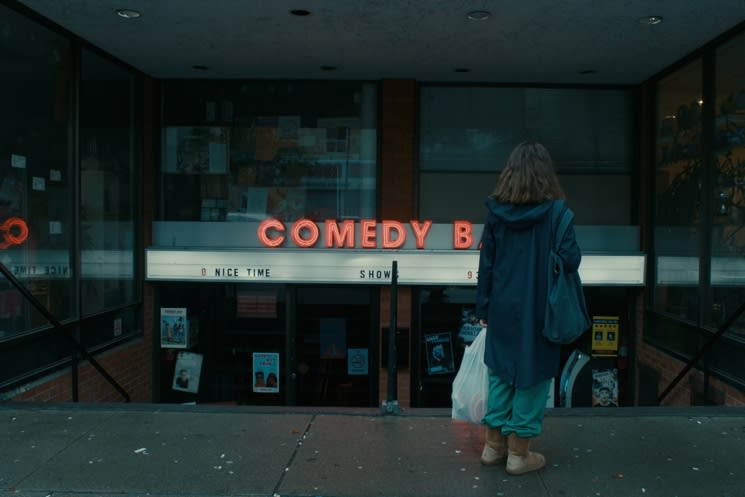Following up her stellar turns in Shiva Baby and Bodies Bodies Bodies, Rachel Sennott continues her rise as one of Hollywood's most exciting talents to watch in I Used to Be Funny. Written and directed by Ally Pankiw in her feature film directorial debut, the film exercises Sennott's dramatic muscles in a way we haven't quite seen before.
Flipping between the past and present, I Used to Be Funny follows Sam (Sennott), a stand-up comedian living in Toronto with her two best friends. An event has taken place that will forever be a way point in her life, and when we first meet Sam, we're in the "after" phase. As she attempts to break through her cloud of depression and piece her life back together, her friends applaud her efforts to shower and encourage her to get back to performing, which she does without success.
The only hints we get early on about what happened to Sam come from a TV news report stating that a young girl, Brooke (Olga Petsa), has gone missing. The disappearance of Brooke and her relation to Sam is revealed in fragments, while the cause of Sam's breakdown, though hinted at, isn't fully explained until the last act of the film. In many ways, the film plays out like a whodunnit with glimpses of a coming-of-age story intertwined.
Pankiw's use of mystery and thriller to build compelling tension shows a remarkable command over the tone of her film, particularly impressive in a first feature. Her confidence is evident as she reroutes and backtracks the story, going from point B to point A without losing focus. I Used to Be Funny is truly a stunning debut for the Canadian filmmaker.
The film leans heavily into the feminist lens, where Sam's world as a young, female comedian prompts her to put forth a steely and sarcastic shell. Sam rolls with the punches and chooses to use self-deprecating humour to get her out of awkward moments when she receives pointed remarks for being a female stand-up. Juxtaposing this with the sombre "after" scenes, Sennott is given a lot to work with.
Her default mode, and probably her most comfortable setting, remains comedic, and even in a film that isn't particularly funny, Sennott finds the humour. However, her abilities as a dramatic actress should not be overlooked: in probably the most important scene in the film — the one the entire movie has been working towards — Sennott is brilliant, never overplaying her hand or underselling the terror of the moment.
I Used to Be Funny has a lot of gold to be panned with only a few minor pebbles in the way, namely that it wraps up in a rather sudden and too-tidy manner. But that doesn't distract from Pankiw's assured directing and a stirring performance from Sennott — two women with strong roots in comedy showing us the humour and tragedy of a woman's very existence.
'I Used to Be Funny' Signals the Arrival of Canada's Next Filmmaker to Watch
Directed by Ally Pankiw
Starring Rachel Sennott, Olga Petsa, Jason Jones, Sabrina Jalees, Caleb Hearon, Ennis Esmer, Dani Kind

Photo courtesy of levelFILM
BY Rachel HoPublished May 31, 2023